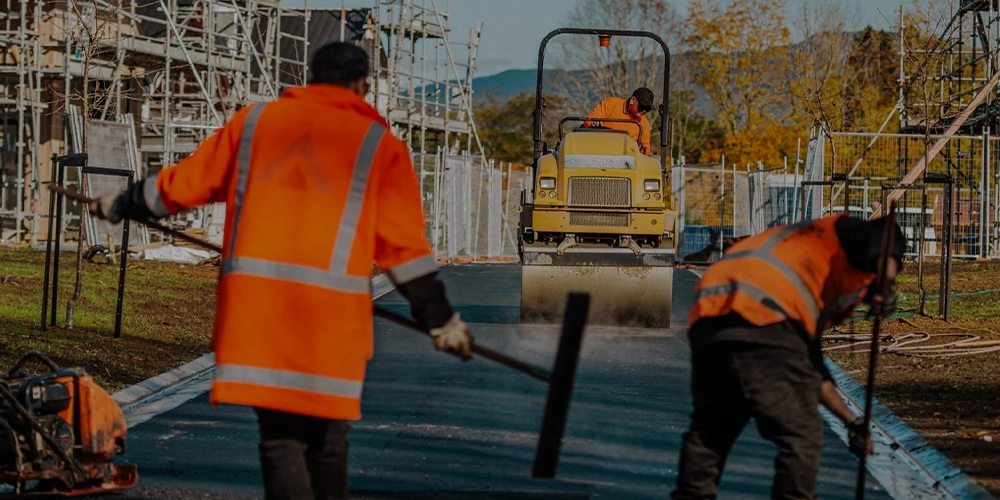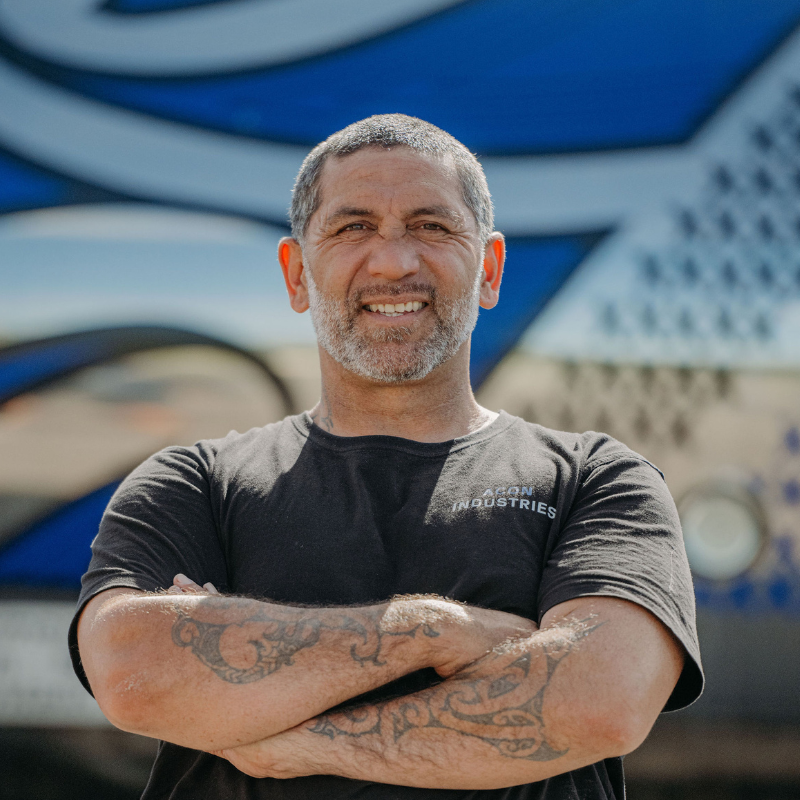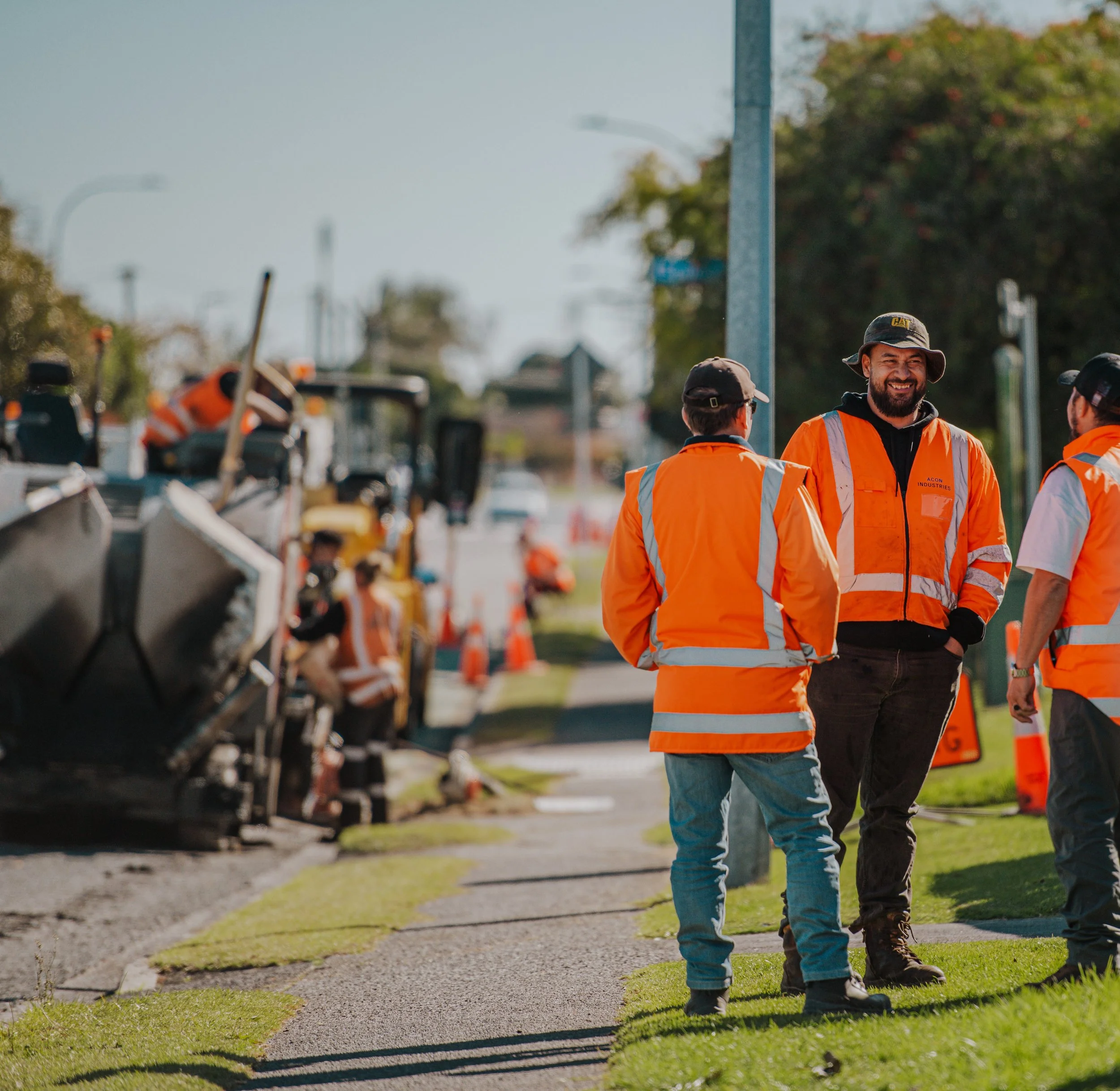Standing Strong in the Land of Giants: The Acon Industries Story
By:
Matt Pryor
From a ute, a tandem trailer, and a homemade asphalt hot box to standing strong in the “land of giants,” Acon Industries is proof that pakihi Māori can not only survive, but lead.

Civil construction company Acon Industries embodies a vision for Māori business success – one built on hard work, Kiwi ingenuity, and a te ao Māori approach. This is the story of Eru Tuhakaraina (Ngāti Ranginui, Ngāi Te Rangi, Ngāti Pūkenga), who has led his pakihi from humble beginnings to delivering major government infrastructure projects.
Born and raised in Tauranga Moana, Eru’s career began straight out of school in 1998, working as a labourer for a Tier 1 company led by his father. It was there he learned the trade from the ground up, building not just skills, but a work ethic that would later fuel his own pakihi.

After years of rising through the ranks, Eru headed to Australia, travelling the East Coast laying asphalt. “We worked alongside a privately-owned business that was thriving in the land of giants. That experience was valuable beyond measure. I knew then it could be done back home,” he says. That realisation lit the entrepreneurial spark that would bring him back to his tūrangawaewae.
In 2015, Eru and his wife Erin brought the whānau back to Aotearoa. They started Acon Industries with a vision and a few essential tools; a ute, a tandem trailer, and a homemade asphalt hot box. Eru took on reinstatement and patching jobs around Tauranga, often knocking on doors to find locals willing to lend a hand. Drawing on his experience working 12-14 hour days, six days a week for another company, and the loss of his father, he was determined not to build a workplace where people were treated like numbers. “I wanted something where people mattered, where they could see a future for themselves,” he says.
That vision has paid off. In the past two years alone, Acon has quadrupled in size and is now the leading independent asphalt and roading contractor in the Bay of Plenty, employing 30 kaimahi and delivering projects across the Bay and Waikato. From asphalt surfacing to chipseal, site prep, and pavement construction, Acon is known for its motto: “Smooth from start to finish.”
Redefining Asphalt in Aotearoa
Aotearoa faces significant asphalt supply constraints. Demand driven by government infrastructure projects and population growth exceeds current production capacity. Aging asphalt plants face environmental consenting challenges, further limiting supply. Nationally, the asphalt market is dominated by Tier 1 companies, with only 4 of 25 plants independently owned. This imbalance, combined with local supply issues, threatens domestic economic growth and limits the ability of smaller operators to grow and participate.
As the world shifts toward more sustainable practices, Acon’s new asphalt plant in Tauriko levels the playing field for small to medium sized businesses to grow. Designed to incorporate up to 30% Reclaimed Asphalt Product (RAP), it positions the company at the forefront of roading innovation in Aotearoa. Purpose-built for environmental, technological, and market needs, the plant represents a cleaner, smarter, and more sustainable approach that is redefining what asphalt production can look like in Aotearoa – responding to the aspirations of partners like the Port of Tauranga.

A Different Kind of Leadership
Eru is upfront about the challenges Māori businesses face in sectors like infrastructure and construction. The market is dominated by large corporates, reinforced by government procurement models that rarely favour smaller, local providers. Competing in that environment takes strategy, resilience, and a strong kaupapa.
For Eru, that kaupapa is based on manaakitanga, kaitiakitanga, and whanaungatanga. “It’s not about rules and consequences, it’s about caring for each other, the environment we work in, and the relationships we build,” he says. This approach shapes everything from on-site work culture to industry partnerships, and it’s been key to Acon’s growth.
Keeping Talent in Aotearoa
With many Māori tradespeople leaving for Australia in search of higher pay, Eru is determined to offer an alternative. “People want to be seen, heard, and valued,” he explains. More are also wanting to step away from the machine. At Acon, kaimahi are shown clear pathways for growth. “If they want it, we’ll wrap the support, training, and opportunities around them to get there,” he says.
By providing clear pathways for career progression and a workplace where kaimahi are treated as whānau rather than numbers, Acon is helping retain talent in Aotearoa and strengthening the local workforce.
Lessons for the Next Generation of Māori Entrepreneurs
Running a whānau business in a market dominated by Tier 1 civil construction companies hasn’t been easy. “Government policy at a national level, economic planning and distribution at the local government level, and procurement models often favour the capability and capacity of large corporate entities. This minimises economic return into local communities,” says Eru. Acon have had to learn how to navigate this and compete against ‘the giants’ to show that they too can deliver outcomes that contribute to economic development and a thriving Māori economy.
Eru’s advice for Māori wanting to build sustainable businesses in challenging times is simple but powerful:
- Do your homework. Know where the industry is heading, understand the demand, and identify the gaps for local providers.
- Think long-term. Build a vision that sustains you and your people well beyond today’s contracts.
- Back yourself. Surround yourself with good people and never lose sight of the values that inspired you start your pakihi.
- Have a strong kaupapa. Your business will have the resilience to weather uncertainty and grow.
Ultimately, Eru sees Māori economic capability as a pathway to greater rangatiratanga. By building thriving, independent businesses, Māori communities can create opportunities, strengthen their economic base, and determine their own futures.
From a ute, a tandem trailer, and a homemade asphalt hot box to standing strong in the “land of giants,” Acon Industries is proof that pakihi Māori can not only survive, but lead.
